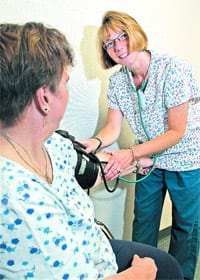MMS President: Opioid Crisis Is Medical Society’s Top Issue
WALTHAM — With more than 1,000 overdose-related deaths last year, and the widespread suffering it has caused, the epidemic of opioid abuse in the Commonwealth has become “issue number one this past year, and number one by a long shot,” Mass. Medical Society (MMS) President Dr. Dennis Dimitri told his physician colleagues in his report to the house of delegates at the society’s 2015 interim meeting.
“What makes this public health crisis different from any other is that it cuts across many medical specialties and has engaged more non-medical stakeholders than any other public health issue in memory,” said Dimitri, who is also clinical associate professor and vice chair of the Department of Family Medicine & Community Health at UMass Memorial Medical Center and UMass Medical School.
He noted that bereaved families, overwhelmed law-enforcement leaders, committed addiction-medicine professionals, and many others have made a compelling case that there must be a committed, sustained response to this crisis.
Dimitri acknowledged the physician’s role in leading to the crisis. “In our desire to control pain,” he said, “physicians unwittingly opened the door to this addiction epidemic,” encouraged by a 2011 report from the Institute of Medicine that declared that treating pain properly is a moral imperative and that undertreated pain is a public health crisis.
Yet, he said physicians are faced with a difficult dilemma: how do we treat pain, and yet prevent addiction to the very medications that can ease pain?
The crisis before the Commonwealth, Dimitri said, “is not just an addiction crisis, it’s also a pain-medicine issue. In trying to end the overdose epidemic, we cannot forget our patients who suffer from acute or chronic pain every day, and depend on opioid medications to manage it.
“Physicians know,” he continued, “that undertreated pain can be just as insidious as over-treated pain. We’ve embraced the concept that pain is the fifth vital sign — that patients in pain are not well.”
The opioid crisis presented the medical society with a challenge from state leaders to become partners in the effort to attack the crisis, and the MMS responded, he said. “We embraced the challenge, and just as law enforcement has taken creative approaches to the crisis, we have done the same.”
Dimitri reminded the delegates of the society’s multiple actions in addressing the crisis: the development of prescribing guidelines, free offerings of continuing-medical-education courses on pain management, discussions with medical-school deans in coordinating pain-management courses as part of the medical-school curriculum, an educational campaign for the public and prescribers, efforts to improve the prescription-monitoring program with state government, and advocacy for more treatment and recovery programs.
“We became not just partners, but bridge builders,” he continued, “fostering dialogue among physicians, elected officials, law-enforcement personnel, human-services providers, and others.”
While reflecting on the society’s accomplishments, Dimitri also looked ahead. “I believe the most difficult question is how success will be defined. How will we know when this concerted effort will have achieved its goals?”
Changes in prescribing patterns, improved and expanded treatment services, and a reduction in overdose deaths are all intermediate goals and useful measures of success, he said, but he also issued a caution.
“The major risk here is that impatience could give rise to proposals that push the pendulum too far in the other direction, and once again abandon patients who are seeking relief from their acute and chronic pain,” he said. “Regardless of how we define success, it must be defined in a collaborative process, with the committed participation of all stakeholders.”
In concluding his remarks, Dimitri noted that “we must have the wisdom to choose the right solutions, the perseverance to stay the course, and never forget those who suffer from pain, as well as those who endure the pain of addiction. We must be the voice of our patients on both sides of the issue. For physicians, there is no more important contribution we can make to ending this crisis.”

